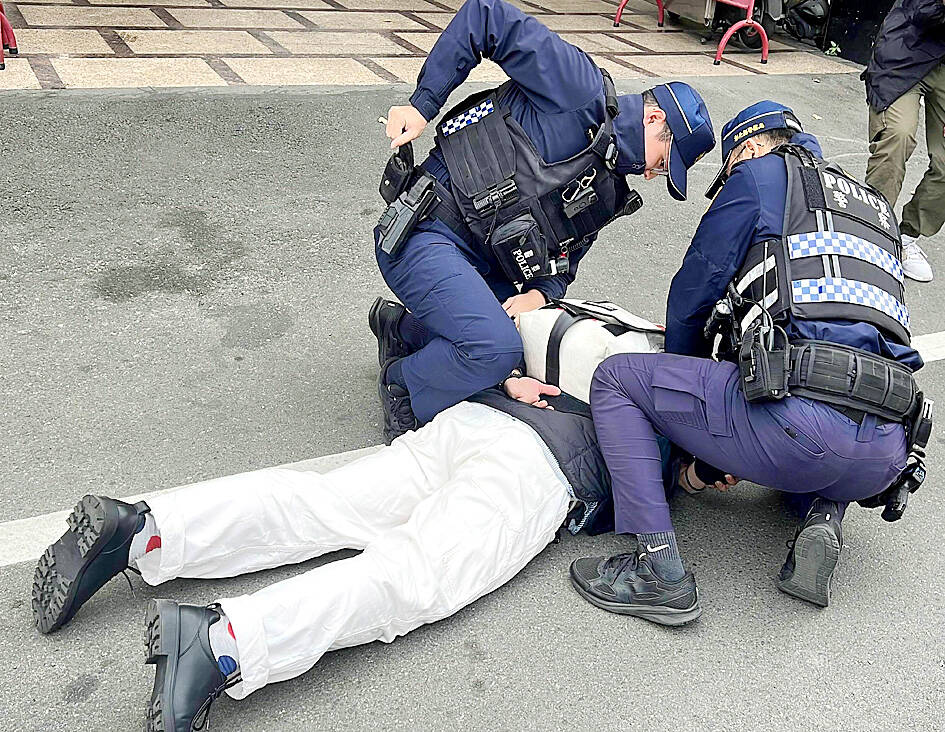Seven hundred and sixty-four foreigners were arrested last year for acting as money mules for criminals, with many entering Taiwan on a tourist visa for all-expenses-paid trips, the Criminal Investigation Bureau (CIB) said on Saturday.
Although from Jan. 1 to Dec. 26 last year, 26,478 people were arrested for working as money mules, the bureau said it was particularly concerned about those entering the country as tourists or migrant workers who help criminals and scammers pick up or transfer illegally obtained money.
In a report, officials divided the money mules into two groups, the first of which are foreigners, mainly from Malaysia or Hong Kong, coming to Taiwan on a tourist visa for quick collection jobs over several days.

Photo courtesy of the police
The second group is migrant workers who have absconded from their work contracts to work as money mules, usually receiving about NT$2,000 per assignment, the report said.
Many of the money mules who travel on tourist visas are Malaysians of Chinese descent who can speak Mandarin, a group that is often targeted for the illegal work in advertisements online, the CIB said.
The ads often promise to pay for their trip to Taiwan and arrange for their lodging, at a hotel or short-term apartment rentals, it said.
The jobs usually take seven to 10 days, and when finished, a Malaysian money mule would be paid about 10,000 ringgit (US$2,224), it said.
However, in the past few months, some people arrested for acting as money mules have come from European countries, such as Romania and Ukraine, as well as African nations, including Nigeria and Ghana, the CIB said.
Some of the foreign money mules told police they answered ads on social media offering well-paying jobs, because they were unemployed or in a dire financial situation and needed to make quick money, it said.
When they were caught, they would tell police they were just helping someone pick up money and claimed to not know they were engaging in criminal activity, it said.
The money mules are often met at an airport upon their arrival by members of a criminal operation and are closely guarded or followed around, and communicate with their employer by WeChat or Instagram, the report said.
They then pick up money at ATMs or directly from victims before departing the country after a few days, it said.
Some money mule suspects do not understand Mandarin or claim not to, or state that they are legitimately picking up money, making it difficult for local police, the CIB said.
As a result, by the time the identity of a suspect is determined and their activities exposed, it is usually too late, as they had already left Taiwan, it said.
The CIB has called for closer international cooperation to crack down on cross-border criminal activity and make checks on suspicious arrivals easier.
It has also urged for more crime-prevention ads and notices at airports and other entry points as deterrents.
Additional reporting by Jason Pan

The CIA has a message for Chinese government officials worried about their place in Chinese President Xi Jinping’s (習近平) government: Come work with us. The agency released two Mandarin-language videos on social media on Thursday inviting disgruntled officials to contact the CIA. The recruitment videos posted on YouTube and X racked up more than 5 million views combined in their first day. The outreach comes as CIA Director John Ratcliffe has vowed to boost the agency’s use of intelligence from human sources and its focus on China, which has recently targeted US officials with its own espionage operations. The videos are “aimed at

STEADFAST FRIEND: The bills encourage increased Taiwan-US engagement and address China’s distortion of UN Resolution 2758 to isolate Taiwan internationally The Presidential Office yesterday thanked the US House of Representatives for unanimously passing two Taiwan-related bills highlighting its solid support for Taiwan’s democracy and global participation, and for deepening bilateral relations. One of the bills, the Taiwan Assurance Implementation Act, requires the US Department of State to periodically review its guidelines for engagement with Taiwan, and report to the US Congress on the guidelines and plans to lift self-imposed limitations on US-Taiwan engagement. The other bill is the Taiwan International Solidarity Act, which clarifies that UN Resolution 2758 does not address the issue of the representation of Taiwan or its people in

US Indo-Pacific Commander Admiral Samuel Paparo on Friday expressed concern over the rate at which China is diversifying its military exercises, the Financial Times (FT) reported on Saturday. “The rates of change on the depth and breadth of their exercises is the one non-linear effect that I’ve seen in the last year that wakes me up at night or keeps me up at night,” Paparo was quoted by FT as saying while attending the annual Sedona Forum at the McCain Institute in Arizona. Paparo also expressed concern over the speed with which China was expanding its military. While the US

SHIFT: Taiwan’s better-than-expected first-quarter GDP and signs of weakness in the US have driven global capital back to emerging markets, the central bank head said The central bank yesterday blamed market speculation for the steep rise in the local currency, and urged exporters and financial institutions to stay calm and stop panic sell-offs to avoid hurting their own profitability. The nation’s top monetary policymaker said that it would step in, if necessary, to maintain order and stability in the foreign exchange market. The remarks came as the NT dollar yesterday closed up NT$0.919 to NT$30.145 against the US dollar in Taipei trading, after rising as high as NT$29.59 in intraday trading. The local currency has surged 5.85 percent against the greenback over the past two sessions, central